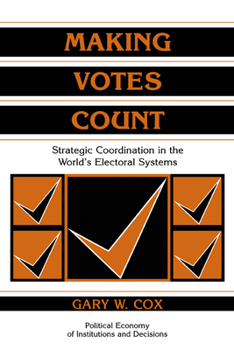Making Votes Count: Strategic Coordination in the World's Electoral Systems
(Part of the Political Economy of Institutions and Decisions Series)
Select Format
Select Condition 
Book Overview
Popular elections are at the heart of representative democracy. Thus, understanding the laws and practices that govern such elections is essential to understanding modern democracy. In this book, Cox views electoral laws as posing a variety of coordination problems that political forces must solve. Coordination problems - and with them the necessity of negotiating withdrawals, strategic voting, and other species of strategic coordination - arise in...
Format:Paperback
Language:English
ISBN:0521585279
ISBN13:9780521585279
Release Date:March 1997
Publisher:Cambridge University Press
Length:360 Pages
Weight:1.35 lbs.
Dimensions:1.0" x 6.0" x 8.9"
Customer Reviews
1 rating
A pleasant challenge
Published by Thriftbooks.com User , 24 years ago
I'm a Freshman at a German university. I had to read most chapters of this book for a class project. First of all I have to state that this book has a really sophisticated language and is quite hard to read for Undergraduate students. I think that Mr. Cox did an excellent work with this book. The excellence starts already with the very logical structure of this book: Parts, Chapters, Sub-chapters and one more sub-division of each sub-chapter. In the first three chapters, Mr. Cox gives us a very detailed insight on electoral systems and the different schools of thoughts about the linkage between electoral systems and party systems. I could easily state that someone who is totally "illiterate" about elections would not have any difficulties reading the book, since every single aspect is being represented in the first three chapters. Then Cox moves on the much more exciting discussions: The game-theoretic stage of strategic voting. Once more in this part of the book, his very structured division is remarkable. In each of the chapters, he does not only talk about the electoral backgrounds only, he also emphasizes the importance of microeconomics (an individual's maximization of utility). Since the reader is also someone eager to maximize its own utility, the themes proposed by Cox about strategic voting in the local level make all sense perfectly. Finally Cox has included some chapters about the Macroeconomic level of elections. Themes about the general effects of electoral systems on the whole political system (for example national party system, the composition of the parliament, government policies and coalitions) are discussed in great depth. After having read his detailed chapters about the local "economics" of voting, it was very exciting for me to also learn something about the macro effects of electoral systems. I want to make some remarks about the chapter construction as well. In every single chapter, Cox has written a sort of introduction briefly stating what he is going to examine in that chapter. Then at the end, he summarizes the key themes of that specific chapter. Even at the end of each part of the book, he does not fail to include a Conclusion as well. His empirical studies and examples that he cites to prove his themes are - to my opinion - unique in the literature that I have studied so far. I would encourage everyone interested with that topic of the linkage of electoral systems and party systems to read and study this book. However I want to conclude my review by reemphasizing that this book includes numerous theoretical themes which may be hard to understand for English as a second language Undergraduates or even for native Undergraduate students. But it is an enjoyable challenge!





